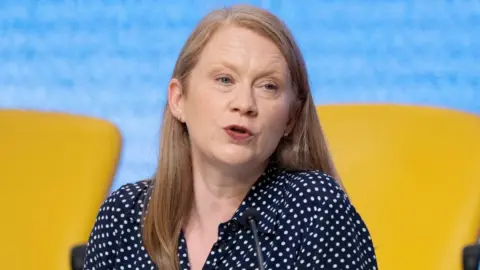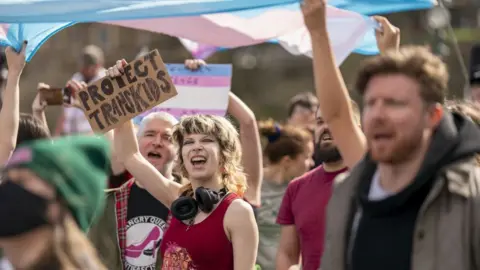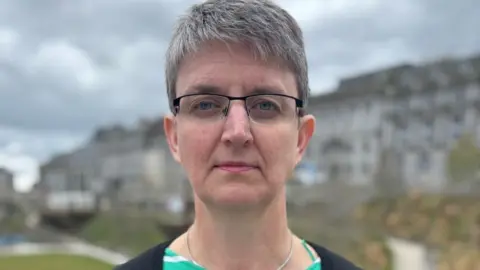Swinney urged to apologise over gender reforms
 Getty Images
Getty ImagesFirst Minister John Swinney has been urged to apologise to women over the government's plan to reform gender recognition laws.
Scottish Conservative leader Russell Findlay attacked Swinney over a bill passed by MSPs in 2022 that would have made it easier for people to change their legally recognised sex.
That bill was blocked by the UK government and Findlay's comments came after the Supreme Court sided against Holyrood ministers in a ruling on the definition of a woman.
Social Justice Secretary Shirley-Anne Somerville said ministers were committed to protecting protecting women's and transgender rights.
The Supreme Court sided with campaign group For Women Scotland in ruling that the terms "woman" and "sex" in the 2010 Equality Act "refer to a biological woman and biological sex".
The ruling means people who are born male no longer have access to female-only facilities and services.
Swinney said he accepted the judgement.
The Scottish Parliament passed the Gender Recognition (Reform) Bill in 2022, with MSPs from all parties backing the proposals.
The move was blocked by the UK government, and has since been dropped by Scottish ministers.
The proposed reforms sparked years of heated debate over women's rights.
In a speech in Edinburgh, Findlay said: "To restore trust in politics, John Swinney must be big enough to admit his mistakes and apologise for the bitter divisions that this has created.
"If he really wants to bring people together, he should start with the women and girls who have lost faith in Scotland's political establishment."
He urged the first minister to "formally end the divisive policy of gender self-identification".
Findlay said: "He must send a clear message that he and his government fully respect the law and women's rights."
 PA Media
PA MediaSomerville reiterated that the Scottish government had "no intention" of bringing the gender recognition reforms back to parliament or seeking to overturn the UK government block on the bill.
She said the Supreme Court judgement, as well as updated guidance from the Equality and Human Rights Commission (EHRC), would provide clarity on access to public services.
The EHRC said it will release an updated code of conduct for services, including the NHS and prisons, in the summer.
Somerville said Scottish ministers would meet the body next week. The government will also set out its next steps in a statement to parliament in the coming days.
EHRC chair Baroness Kishwer Falkner told the BBC's Today programme: "Single-sex services like changing rooms must be based on biological sex. If a male person is allowed to use, it's no longer is a single-sex space."
Somerville said the government would "await the commission's guidance this summer and move forward so that people are reassured – both women and the trans community – (that) public services and other bodies are available and inclusive for everyone".
She warned of "fear and apprehension" in the transgender community but said ministers would work to show "they are valid and they are loved".
 PA Media
PA MediaScottish Labour leader Anas Sarwar welcomed the clarification from the Supreme Court.
He said there was an "urgent" need for the Scottish government to issue guidance to public bodies to uphold the Equality Act.
He whipped his MSPs to vote for the Gender Recognition Reform Bill at Holyrood, leading to two Labour frontbenchers leaving their posts.
Sarwar has since U-turned on his support for the bill, and has also backed nurse Sandie Peggie in her employment tribunal against NHS Fife over having to share a female changing room with a trans doctor.
The MSP said he had been open that his party made "mistakes" in the passing of gender reforms.
He told BBC Scotland News: "But throughout all of that and since, I have believed in the protection of single-sex spaces based on biological sex."

Scottish Green equalities spokesperson Maggie Chapman urged the Scottish Parliament to resubmit the gender recognition reform bill for royal assent.
She also claimed the court's ruling had undermined the UK government's argument for blocking the legislation.
Chapman told BBC Scotland News the Supreme Court ruling could have a "chilling effect" on human rights.
"We know that when you start to erode the rights of any one group, the rights of other groups are up for grabs too," she said.
The Green MSP warned transgender people were "scared".
She added: "If you prevent trans people from using public toilets, from using facilities like that, you're saying they can't come out, you're saying they can't be seen in society."
